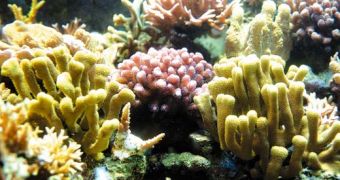According to a new research carried out by scientists working with the Georgia Institute of Technology, corals that find themselves attacked by a species of toxic seaweed get some much needed help from gobies, a type of fish no longer than one inch.
Interestingly enough, the corals do more than just sit by and wait for the fish to realize that they are in trouble and need someone to step in and clear them of the alga threatening their wellbeing.
Thus, they “summon” the gobies with the help of chemical compounds that they release into the water and which function very much like a 911 call does.
The scientists who have looked into this issue explain that the fish are quick in responding to the corals' call for help, meaning that it only takes a couple of minutes before they arrive at the scene and start feeding on or simply biting off the toxic seaweed.
Naturally, the fish are so keen on looking after the corals only because their very own existence is threatened.
Thus, gobies use the corals as shelter and protect them in order to make sure they will still have a place to hide when predators happen to come by.
Mark Hay, a professor in the School of Biology at Georgia Tech, made a case of how, “This species of coral is recruiting inch-long bodyguards.”
Furthermore, “There is a careful and nuanced dance of the odors that makes all this happen. The fish have evolved to cue on the odor released into the water by the coral, and they very quickly take care of the problem.”
Newswise explains that the gobies that actually ingest the toxic seaweed also do it in order to make themselves less desirable to predators.
“The fish are getting protection in a safe place to live and food from the coral. The coral gets a bodyguard in exchange for a small amount of food. It’s kind of like paying taxes in exchange for police protection,” professor Mark Hay goes on to explain.
The findings of this study have been published in their entirety in the journal Science.

 14 DAY TRIAL //
14 DAY TRIAL //